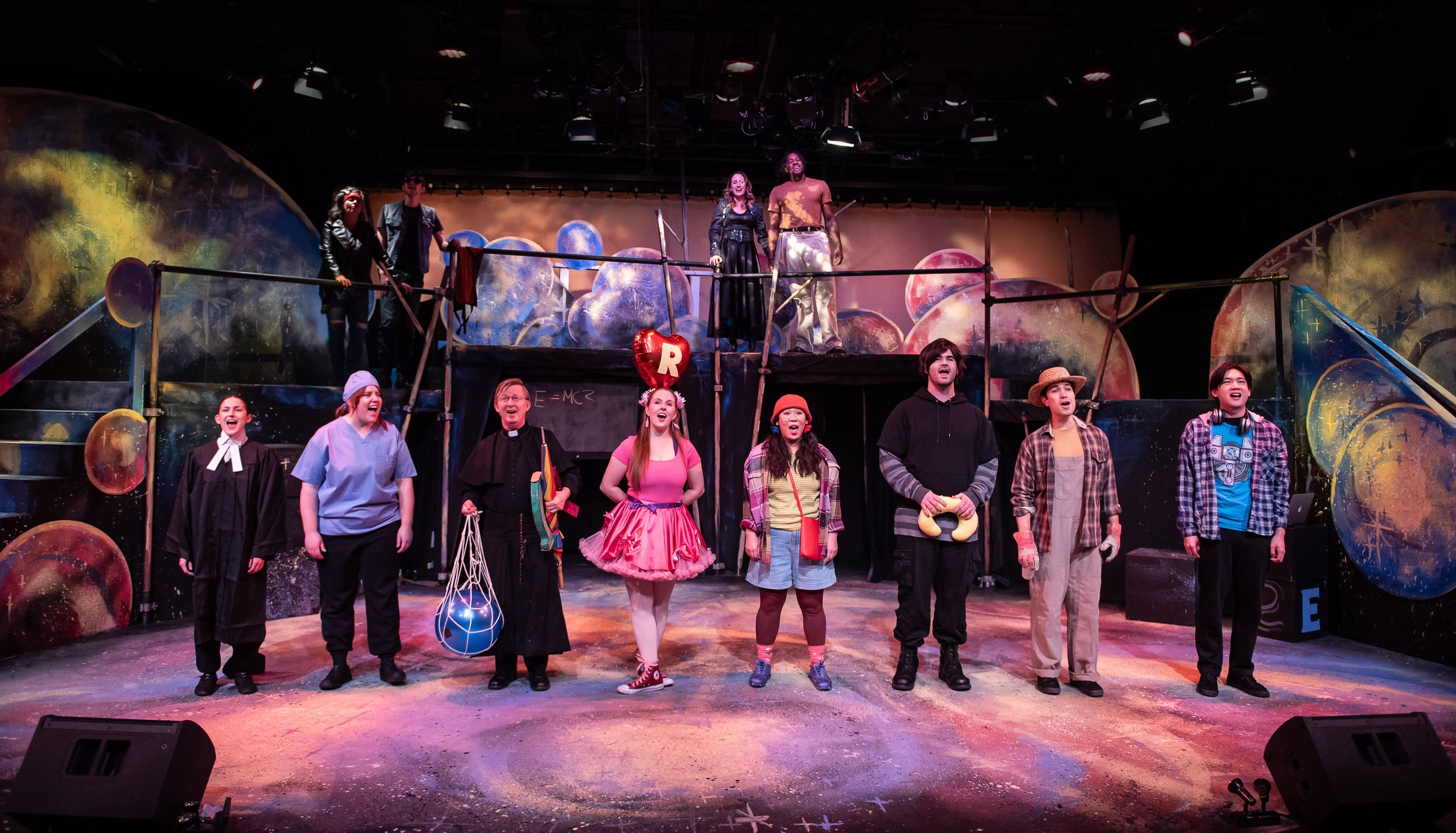Theatre review: Reflections on Crooked Walking skips down its own whimsical path
The Firehall Arts Centre brings fresh life to Ann Mortifee’s quirky fantasy musical, while retaining some of its ‘80s flavour
Reflections on Crooked Walking takes place in a strange world of talking animals, evil queens, and Dahl-meets-Seuss sets. Photo by Emily Cooper
Reflections on Crooked Walking is at the Firehall Arts Centre to December 24
WHILE CHRISTMAS SONGS and candy canes are currently sweetening theatres across Vancouver, there’s one stage in town that dares to go down a different path.
And while the title of Firehall Arts Centre’s current production is Reflections on Crooked Walking, the show is skipping more than walking down its enjoyably quirky path. Moreover, the show begs the question, “What’s wrong with crooked walking anyway?”, as the musical celebrates individuality and self-belief.
With a book and score by Ann Mortifee, Reflections on Crooked Walking made its world premiere at the Arts Club more than 40 years ago and the cast album was nominated for a Juno Award. Under the expert guidance of renowned director Donna Spencer, the playful and character-driven choreography of Joe Laughlin, and the stylistically informed music direction of Jane Milliken, this production keeps the messaging and charm of Mortifee’s work fresh and relevant. The score, which ranges from blues and pop to legit musical theatre, has a distinctly early-’80s feel, and under Milliken’s baton, the cast and musicians do a fantastic job delivering the score with the appropriate styling.
While the show has the whimsical feel and overly animated characters you find in children’s theatre, Reflections on Crooked Walking also possesses a sophistication that appeals to critical-thinking adults. When two mystical beings decide to entertain themselves by casting a sleeping sickness over the town of Forest Near, the four townspeople who are still awake search for a cure. Their adventures lead them to a mysterious world with talking animals, odd characters, and general absurdity. Opia, who is one of the mystical beings presiding over our heroes, is on a mission to end their quest and put them all to sleep.
As Opia, Meghan Gardiner is sensational, milking the role for all it’s worth and bringing the house down with her singing. As the resident villaness, Madame ‘O’ dons a new persona in each scene, including a jazz singer, ice queen, and fire queen. While Gardiner revels in her evilness and the novelty of transforming into each new persona (with the help of Barbara Clayden’s fabulous costumes), the audience can revel in listening to Gardiner’s exquisite voice. Gardiner demonstrates her range, from the expert vocal control in “Don’t Rock the Boat”, and a powerful strong belt in “Ice Queen”.
As Gardiner’s counterpart mystical being, Doorman, Jesse Lipscombe plays a variety of equally dramatic but friendly characters, such as the talking bird Harvey Seymour, a kooky librarian, and a professor who unapologetically comes across as a mad scientist, thanks again to Clayden’s amusing costuming. Lipscombe’s role represents the forces of opportunity, and as such, he offers gentle, interesting personalities, not to mention some pleasing melodic singing.
As the brave leader of the four heroes trying to save their townspeople, Evelyn Chew is endearingly childlike as Gabby. It’s the curiosity that Chew displays in her character that drives the show, starting with her solo in the opening number “Work”. Sanders Whiting brings warmth and likability to the role of logic-driven Reverend Blinkers, including his wonderment in “Books, Books, Books”, when he engages in a marathon of speed-reading multiple novels.
Jennifer Lynch delivers balletic grace and effervescent charm and energy as Feathertoes. Pulling off a continuous string of chaîne turns and graceful poses in fifth position, Lynch also has strong vocal projection, as demonstrated in her solo “Life is Wonderful”. Tanner Zerr is loveable as the down-hearted Sufferton. With his head constantly dropped, shoulders slumped, and long black hair hanging over his face, Zerr is a cross between an emo kid and Eeyore from Winnie the Pooh. His persona begs the audience to root for him and makes for great dynamics with the rest of the characters.
Jeffrey Michael Follis shines with enthusiasm in his multiple quirky personas as Wayless, complemented by the equally offbeat charm of Daune Campbell as Nimbleknees. Marija Danyluk is captivating to watch in ensemble parts that ordinarily wouldn’t draw the eye, and her dancing is also excellent, including a beautiful split ring leap.
One of the standout efforts of this show is the work of puppet designer/director Stephanie Elgersma, whose work helps pull us into a setting that blends the realms of Alice in Wonderland, Dr. Seuss, and Roald Dahl. One of the highlights of the show is a giant spider that both excites and terrifies. Set and properties designer Charlie Beaver and lighting designer Ted Roberts also get to demonstrate their creative minds here. The outer pieces of Beaver’s set serve as a constant reminder of the story’s cosmic theme, and Roberts’s lighting helps bring the fantasy elements of the show to life, such as the lit-up eyes of the spider.
Those kinds of touches help to update Mortifee’s 40-plus-year-old musical, while staying true to the show’s stylings. Chew delivers such dated phrases as “Glorious gargoyles” and “What’s up doc?”, with such energy and conviction that it doesn’t seem awkward. Likewise, Gardiner’s rock-solid vocals draw appreciation for Mortifee’s score.
In one interesting scene, Opia leads her goons Wayless and Nimbleknees in pushing pills on one of the characters. The song is appropriately titled “Pills”, and in it, Wayless and Nimbleknees scoot around the stage in a shopping cart. The scene recalls what's happening right outside the theatre doors in the Downtown Eastside, and whether intentional or not, helps to make this show relevant to current times. So while Reflections on Crooked Walking is an imaginative show that will continue to captivate children, there are deeper layers here for those who, like the character of Gabby, are curious.













